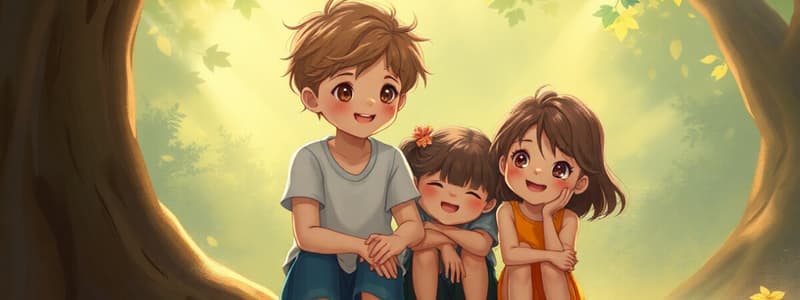Podcast
Questions and Answers
Which characteristic is NOT associated with popular children?
Which characteristic is NOT associated with popular children?
- They frequently ignore peer suggestions. (correct)
- They listen attentively and maintain open communication.
- They are happy and control their negative emotions.
- They often show enthusiasm and concern for others.
Neglected children are frequently disliked by their peers.
Neglected children are frequently disliked by their peers.
False (B)
What type of peer status is characterized by being frequently nominated as best friend but also disliked?
What type of peer status is characterized by being frequently nominated as best friend but also disliked?
Controversial
Children often prefer ______ peer groups during late childhood.
Children often prefer ______ peer groups during late childhood.
Match the following peer statuses with their definitions:
Match the following peer statuses with their definitions:
Flashcards
Peer Relationships
Peer Relationships
Interactions with peers are important for children's emotional well-being and security.
Peer Groups
Peer Groups
Groups of children who interact frequently.
Popular Children
Popular Children
Children frequently chosen as best friends and rarely disliked.
Average Children
Average Children
Signup and view all the flashcards
Neglected Children
Neglected Children
Signup and view all the flashcards
Rejected Children
Rejected Children
Signup and view all the flashcards
Controversial Children
Controversial Children
Signup and view all the flashcards
Popular Child Characteristics (1)
Popular Child Characteristics (1)
Signup and view all the flashcards
Popular Child Characteristics (2)
Popular Child Characteristics (2)
Signup and view all the flashcards
Popular Child Characteristics (3)
Popular Child Characteristics (3)
Signup and view all the flashcards
Popular Child Characteristics (4)
Popular Child Characteristics (4)
Signup and view all the flashcards
Popular Child Characteristics (5)
Popular Child Characteristics (5)
Signup and view all the flashcards
Study Notes
Building Friendships
- Children spend more time interacting with peers in late childhood.
- Good peer relationships are crucial for children's emotional development and sense of belonging.
- Peer size increases, and adult supervision decreases.
- Children often prefer same-sex peer groups at this age.
Peer Status Types
- Popular: Frequently nominated as best friend; rarely disliked.
- Average: Receive an average number of positive and negative nominations.
- Neglected: Seldom nominated as best friend but not disliked.
- Rejected: Infrequently nominated as best friend; also disliked.
- Controversial: Frequently nominated as best friend but also disliked
Popular Children's Traits
- Give out reinforcement.
- Act naturally.
- Listen carefully and promote open communication.
- Happy and manage negative emotions.
- Show enthusiasm and concern for others.
Studying That Suits You
Use AI to generate personalized quizzes and flashcards to suit your learning preferences.




